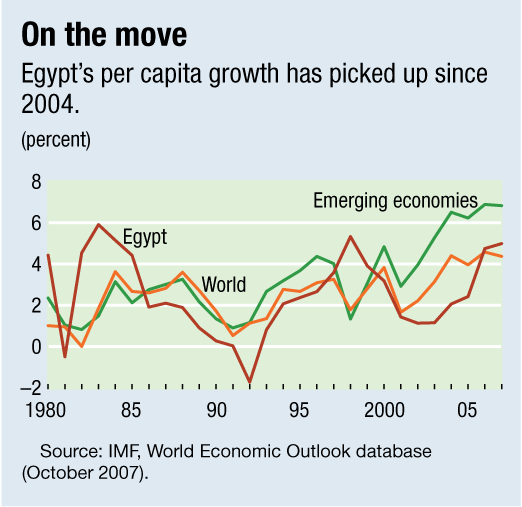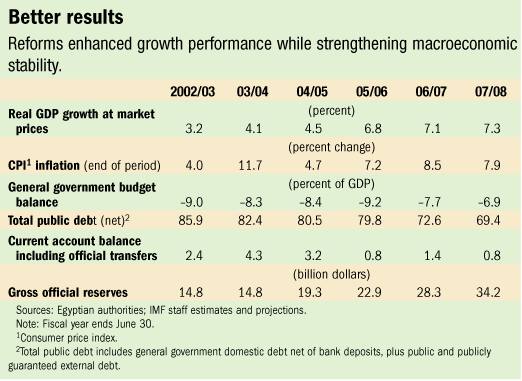
Typical street scene in Santa Ana, El Salvador. (Photo: iStock)
IMF Survey: Egypt: Reforms Trigger Economic Growth
February 13, 2008
- Egypt's recent growth performance has been the best in years
- Growth was sparked by economic reform, liberalization
- Further fiscal consolidation, other reforms are key to sustaining growth, creating jobs
Growth in Egypt has picked up steadily since 2004 (see chart), making it one of the Middle East's fastest-growing economies.

Operator changing bobbins in a polyester spinning plant in Egypt, where growth has picked up steadily since 2004, making it one of region's fastest growing economies. (photo: scphotos)
Annual Economic Health Check
It launched bold reforms in 2004 that, along with a favorable external environment, have triggered an impressive acceleration of growth, to 7 percent in 2006/07.
In its most recent review of Egypt's economy, the IMF says the expansion has broadened from energy, construction, and telecommunications to such labor-intensive sectors as agriculture and manufacturing.

According to the IMF, the Egyptian economy will continue to grow at 7-8 percent if ongoing improvements in the business environment succeed in raising investment to more than 25 percent of GDP.
Between end-2004 and end-March 2007, 2.4 million jobs were created. As a result, unemployment—chronically high in this emerging market economy—has dropped from 10.5 percent to 9 percent. Exports and imports also rose sharply, along with workers' remittances, Suez Canal receipts, and tourism revenues.
Better business climate
The reforms have started to tackle critical impediments to private business and investment.
• The establishment in 2004 of a well-functioning foreign exchange market lifted formal and informal restrictions on access to foreign exchange that had long hampered business in Egypt.
• In two rounds of reductions, the weighted average import tariff was cut to about 6.9 percent by 2007, accelerating integration with the global economy.
• Personal and corporate income tax rates were slashed, and tax administration is being modernized, with a move to self-assessment of personal income taxes.
• Business regulations have been streamlined to speed up customs clearance and facilitate registration of new businesses and property. Egypt consequently earned the honor of top reformer in the World Bank's 2007 Doing Business Report.
• A wide range of productive assets, including joint-venture banks and the fourth-largest state bank, have been privatized. More than half the banking system is now in private hands.
• Governance and financial soundness of state banks and banking supervision have been strengthened in the context of broader, ongoing financial sector reforms. Those reforms are also modernizing the insurance sector and capital markets.
Structural reforms were complemented by prudent macroeconomic policies. Monetary policy, underpinned by greater exchange rate flexibility, has become more effective in targeting and containing core inflation. The fiscal deficit for 2006/07 was reduced to about 7.7 percent of GDP from an average of 9 percent in recent years. The decline is due to the tax reforms, fuel price adjustments, wage restraint, and windfall receipts from a telecom license sale.
In a global environment flush with cash, investors took notice. Large capital inflows—mostly foreign direct investment—from Europe, the countries of the Gulf Cooperation Council, and North America reinforced the growth impact of the reforms. Egypt's balance of payments has recorded a surplus since 2004/05, bringing official reserves to the equivalent of more than 6 months of imports and 8 times short-term debt—strong insurance against any reversal of capital flows (see table).

Tasks ahead
With Egypt's labor force growing rapidly, sustained growth that produces jobs will be essential. This will require sustained higher investment. Structural reforms therefore need to continue to tackle constraints on business development, such as inadequate infrastructure, red tape, poor public service delivery, and the scarcity of skilled labor.
To improve access to finance, particularly for smaller firms, the authorities aim to rapidly complete the bank recapitalization and restructuring program and further improve banking supervision. Complementary regulatory and judicial reforms—such as setting up specialized economic courts and enhancing the role of the private sector-led credit bureau—should help improve contract enforcement and creditor protection. These steps will facilitate bank lending to smaller enterprises.
The authorities have also started to tackle the underpricing of energy. They hiked diesel prices in mid-2004; further adjusted retail prices in mid-2006; and, in late 2007, launched a three-year program to phase out most industrial energy subsidies.
However, prices for most energy products are still far below international prices. This distortion could attract investment into sectors where Egypt does not have a long-run comparative advantage. It also encourages levels of energy consumption that impose high environmental costs and uses up public funds that could be spent more productively, for example on education or infrastructure.
Fiscal consolidation
Reducing the budget deficit is key to raising national saving to finance higher investments. It is also key to supporting monetary policy in containing inflation and speculative inflows and to reducing the net public debt. The government has embarked on a program that aims to reduce the deficit gradually to 3 percent of GDP by 2010/11, which would put public debt on a firmly declining path.
Achieving the fiscal targets will require continued retrenchment in the wage bill, reform of sales and property taxes, more efficient cash management and public spending, and lower subsidies.
The favorable external environment and Egypt's continued strong growth provide an opportunity for early action in these areas. Early action would also contribute to a strong and swift investor response. At the same time, the authorities should continue to strengthen social safety nets and help the poorest segments of society benefit from opportunities offered by a growing economy.


